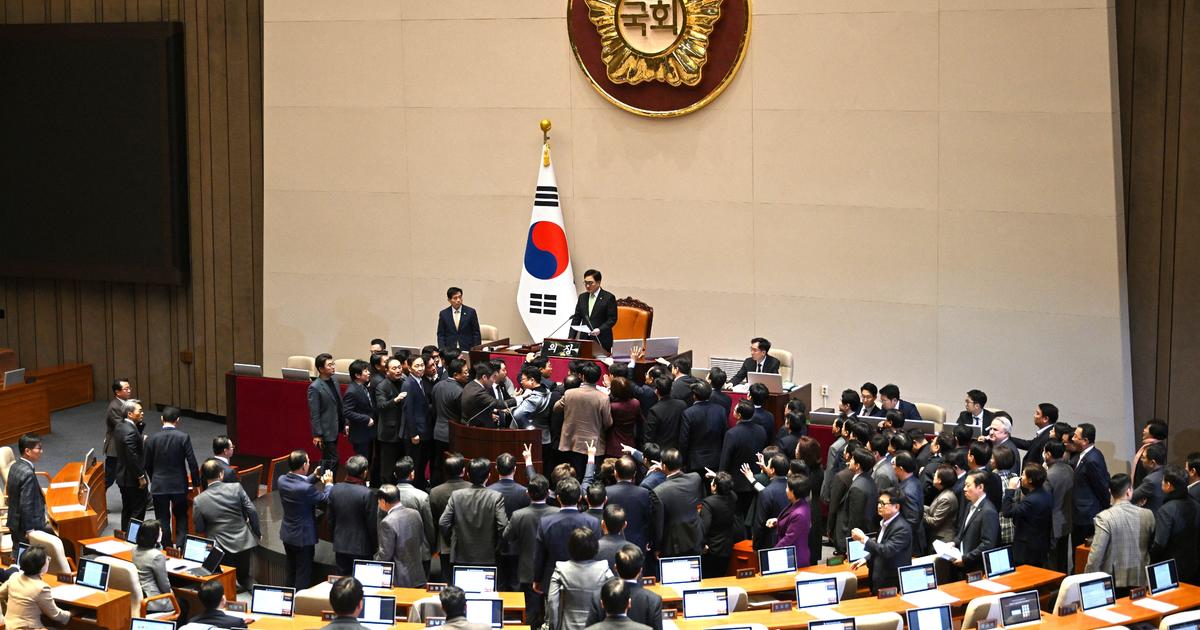Seoul, South Korea South Korea’s opposition-controlled National Assembly voted on Friday to impeach acting President Han Dak-soo despite violent protests by ruling party lawmakers, further deepening the country’s political crisis sparked by a stunning President Yeon Suk-yeol. Imposing martial law and The impeachment that followed Earlier this month.
Han’s impeachment means that he will be stripped of the powers and duties of the president until the Constitutional Court decides whether to dismiss him or return him to office. The court is already reviewing whether to uphold Yoon’s previous impeachment. The dismissal of the country’s two top officials exacerbates political unrest, deepens economic uncertainty, and damages its international image.
The unicameral National Assembly approved Han’s impeachment motion by 192 votes to 0. Lawmakers from the ruling People Power Party boycotted the vote and gathered around the podium where Assembly Speaker Woo Won-shik was sitting and shouted that the vote was “invalid” and demanded Wu’s resignation. No violence or injuries were reported.
Jung Yoon-ji/AFP via Getty Images
PPP lawmakers protested after Wu called a vote on Han’s impeachment motion after declaring that its passage would require a simple majority in the 300-member chamber, not a two-thirds majority as the PPP claimed. It is possible to remove most officials in South Korea by the National Assembly by a simple majority, but removing the president requires the support of two-thirds. There are no specific laws regarding the impeachment of an acting president.
Han’s powers will be formally suspended when copies of his impeachment document are delivered to him and the Constitutional Court. Deputy Prime Minister and Finance Minister Choi Sang-mook will assume his duties.
Agence France-Presse notes that Pakistan People’s Party leader Kooyun Seung-dong said after the vote that Han “must continue to lead state affairs without submitting to the opposition’s passing of the dismissal proposal.”
But Han said in a statement that he “respects Parliament’s decision” and will wait for the Constitutional Court’s subsequent decision on whether to uphold the decision.
Jung Yoon Ji/AFP via Getty Images
Han, who was appointed prime minister by Yoon, became acting president after Yoon, a conservative, was removed by the National Assembly two weeks ago for imposing martial law on December 3. Han quickly clashed with the main opposition Liberal Democratic Party while opposing opposition-led efforts to fill three vacant seats on the Constitutional Court, conduct an independent investigation into Yoon’s martial law decree, and enact pro-farmer bills.
At the heart of the fight is the Democratic Party’s demand that Han approve the assembly’s nominations of three new judges to the Constitutional Court to restore its full nine-member bench before it issues its ruling on Yoon’s impeachment. This is a politically sensitive issue because the court’s decision to remove Yoon as president needs the support of at least six justices, and adding more justices is likely to increase the odds of Yoon’s ouster. Yoon’s political allies in the ruling People Power Party oppose the appointment of the three judges, saying Han should not exercise presidential authority to make appointments while Yoon has not yet been formally removed from office.
Hahn said Thursday he would not appoint judges without bipartisan approval. The Democratic Party, which has a majority in the Assembly, filed a motion to impeach Han and passed bills calling for the appointment of three judges.
South Korean investigative agencies are investigating whether Yoon committed rebellion and abuse of power through his marriage law decree. His defense minister, police chief and several other senior military leaders had already been arrested over the deployment of troops and police officers to the National Assembly, leading to a dramatic standoff that ended when lawmakers managed to enter the chamber and voted unanimously to repeal Yoon’s decree. .




